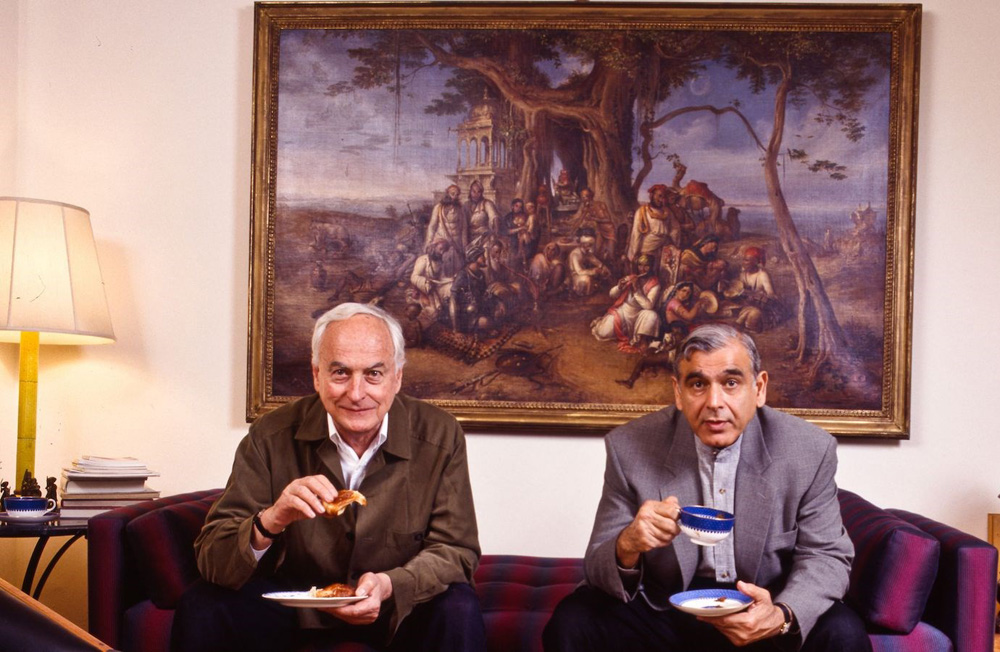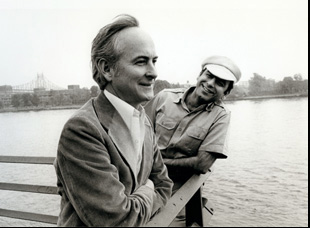If Stephen Soucy was ever was in need of inspiration of how to deliver his debut feature on time and budget, he only needed to look at what his subjects Ismail Merchant and James Ivory were capable of, putting together opulent period pieces together with barely enough pennies to rub together. As Emma Thompson says in the film about the legendary filmmakers for whom she starred in “Howard’s End” and “The Remains of the Day,” “You required an immense amount of stamina,” when the productions packed as much as they could into tight schedules and cut every corner they could to make a day without sacrificing what was truly important. In some ways, the greatest tribute that Soucy could possibly pay was when he found himself in the edit room staring down another arduous round of financing in order to afford some well-known narrator for the few bits of voiceover in the film when there was an obvious yet unorthodox solution — just use his own.
“At some point Jon [Bright, my editor] was the one who came up with the idea, ‘Yeah, we should look at integrating you,” and because those four films were so important to my life, we just felt that it would be okay for me to do the narration,” says Soucy, who built the history of the company around the filmmakers’ remarkable run from 1985 with “A Room With a View” through 1993 with “The Remains of the Day,” with “Maurice” and “Howards End” in between. “I think we did it where I’m not in any way taking away from the proceedings.”
In fact, having Soucy’s voice in the picture only adds to the feeling of revelation around what “Merchant Ivory” uncovers in terms of how much the filmmakers invested of themselves in their work, films that may be remembered now as highbrow literary adaptations yet were infused with passion for reasons beyond an appreciation for E.M. Forster. Taking a unique tact in celebrating the filmmakers’ nearly five-decade filmography of over 60 films by breaking it up into the contributions of the four primary collaborators — in addition to Merchant and Ivory, it profiles Ruth Prawer Jbhvala, the writer on 20 of their films, and Richard Robbins, the composer of 24 of them — and collects interviews with cast and crew that can look at each other more now as a traveling company with their credits denoted less by films they appeared in than the years they spent on Merchant Ivory sets. After Ivory and Merchant met on the steps of the Consulate of India and New York and started seeing movies together, it was only a matter of time before they started making them, becoming acolytes of Satyajit Ray and finding a creative partner for life after optioning Prawer Jbhvala’s “The Householder” to adapt as their first joint venture.
When Hugh Grant recalls of being on a Merchant Ivory production, “In those days, film sets crackled with subliminal heat,” Soucy learns that it may have been even more than the actor who got his big break in “Maurice” could’ve known at the time when Merchant, Ivory and Robbins were all romantically entangled at one time or another and “Merchant Ivory” connects behind-the-scenes frisson with those stirring dramas that were ultimately committed to celluloid, filled with unrequited love and emotions that their characters couldn’t bring themselves to express. Just as the deeper look into their films reveals there was plenty going on beneath the surface, which is saying something given Jenny Beavan and John Bright’s meticulously detailed costumes, there’s more than meets the eye in terms of Soucy’s approach to elicit real insight into their work, compiling an impressive array of interviews as most would, but pressing for real depth and getting more than a few saucy anecdotes. After premiering closer to home for both himself and Ivory at DOC NYC this past fall, “Merchant Ivory” is heading west to the Palm Springs Film Festival this weekend where it is launching alongside a big-screen retrospective of their films “Quartet” (Jan. 7), “Shakespeare Wallah” (Jan. 8), “Maurice” (Jan. 9), “The Bostonians” (Jan. 12) and “Howards End” (Jan. 14) and Soucy shared how he ended up making a definitive documentary about the famed filmmakers and relishing the opportunity to introduce them to future generations.
Merchant Ivory films were a big part of my life, growing up in the ‘80s on through the ‘90s and “Maurice” specifically was a very influential film. I think I was 19 years old when a friend of mine showed me that film on one of those combo TV/VCRs, and I had seen “A Room with a View” before that, but once I saw “Maurice,” because I was gay, but I wasn’t out yet, seeing that story as presented by Merchant Ivory was a significant signpost in my life and I was like, “Who are these guys?”
I was also living in upstate New York and they lived in the Hudson River Valley, and I thought that was cool as somebody who was an aspiring filmmaker that they were right in my backyard. I actually went to a screening for “Howard’s End” and “The Remains of the Day” and I met them back when I was 21 years old, and then fast forward to me moving to Los Angeles [for] film school and I made a bunch of short films, [including] “Rich Atmosphere: The Music of Merchant Ivory Films,” which is really what started me on this Merchant Ivory journey. That’s where I was introduced to James Ivory from my friend Peter Cameron, who was the novelist of “The City of Your Final Destination,” and I interviewed Jim twice for “Rich Atmosphere,” and [when I] decided those talking head interviews were really boring, I made it into an animated film and worked with Jack Cunningham, this incredible animator in London. I showed that to James Ivory and he absolutely loved it and I sensed an opening.
At that point, we had a long conversation about [a potential documentary], and I said, “I want to make the definitive look at what Merchant Ivory, the production company, accomplished, but also you and Ismail and your relationship and everything around that.” The Merchant Ivory family is vast, and that was probably one of the challenges of this — how do you tell this over 50-year [history], and with Jim winning the Oscar for “Call Me By Your Name,” an even longer trajectory in two hours. I do have a ton of extras that we will release on the DVD when Cohen releases [it on home video], but the arc of their story was so big and I just started going and I just started traveling the globe getting all those interviews.
You mention wanting to get away from talking head interviews for your short and inevitably, you have to have them here, but I was impressed with how you were able to get people out and about, visiting Jenny Beavan and John Bright at Cosprop and taking James Ivory out to the Consulate of India in New York where he first met Ismail. What was it like to keep this lively?
And there were things that I shot that didn’t make it into the film that again will hopefully be featured when Cohen Media releases a DVD. I even had John Pym, a writer who wrote four books on Merchant Ivory, walk the grounds of where they shot the Sacred Lake scene from “A Room with a View,” so whenever I could get out of the talking head in the room, of course I took that opportunity. Shooting the drone footage of Jim’s house in Claverack [in New York], that’s one of my favorites, and we did it as often as we could, but [we were] on the run.
One of the biggest trips I took was to London where I interviewed 30 folks from the Merchant Ivory family in like two weeks. That’s when I got Vanessa Redgrave, Helena [Bonham Carter], Emma [Thompson], Hugh Grant, and I was able to go to Vanessa’s home, but you can tell in the film [we had a central location since] some of the backgrounds are the same. My only regret [was] one of the interviews that I was hoping to get that I didn’t [was] Maggie Smith. She was in “Quartet” and “A Room with a View,” and she and I talked on the phone, but she said to me, “I’m redoing my house. It’s a mess. I can’t meet with you [but besides] I don’t have anything to say about Merchant Ivory.” And I [said], “You were in two films. What are you talking about?” And I was so busy getting 30 interviews, I let her off the hook, but one thing she said that was so amazing was, “The only thing I have to say about Merchant Ivory is the chaos and the curry.” Because so often it was chaotic because there wasn’t enough money. Everybody was complete squeezed. And Ismael with his curry dinners for the cast and crew [in order to create a familial environment — and save on the budget].
It’s really ingenious how this is structured around the four central collaborators – Ismail Merchant, James Ivory, Ruth Prater Jhabvala and Richard Robbins – and you’ll note the number of years any other cast or crew was part of this company. Was that a foundational part of this you could build on?
My editor Jon Hart, who’s also co-writer on the film, and I went around and around on that. I kept bringing ideas to John, [and] there was an idea of doing the early films, the middle films, the late films, and it just wasn’t working. I kept harping on the four films that had the most impact on my life — “Room with a View,” “Maurice,” “Howard’s End,” and “Remains of the Day” — and somehow we just had this epiphany of let’s pair one person to each film. I was interviewing Jim once and he said to me, “Well, ‘Howard’s End’ was Ruth’s film. That was her favorite E.M. Forster book.” And then I think at another time I asked him about Richard Robbins [being] nominated for the Oscar for “Howard’s End” and “Remains of the Day,” and Jim was like, “Yeah, ‘Remains of the Day,’ that was really Dick’s film.” So when I heard those two things, that’s when the light bulb went on.
You really show how personal these films are, which was the real revelation to me – connecting what was going on personally to what you would see on screen. Did you feel like there was a dam breaking there with time since it’s been something rarely discussed before?
It’s the trust that you build. My relationship with Jim started [with] saying to me, “Who is this guy Stephen Soucy?” But then interview number one, interview number two, interview number three, it’s the trust that you build, and then the fact that I was sharing with him, “Oh, I’m going to London,” and his assistant Melissa Chung was very helpful in opening some doors for me [there], so the facilitating of that was also something that just slowly built the trust between Jim and myself. And it didn’t feel like a dam was breaking, but I think I did six interviews with Jim over the course of three years and what it felt like is I went further and further with my questioning strategy because again, the trust was there, and also Jim published his memoir, “Solid Ivory,” maybe eight months before my final interview with him, so when he’s sitting at the top of the stairs in his home in Claverack, I really pushed him and I told him I was going to do that. I sent him the questions before and I said, “I really want to go in depth because you have it out in print [in the book].”
For a long time, he gave [the] pushback, “Oh, I can’t talk about the intricacies of the Ismail/Richard Robbins/James Ivory kind of triangular relationship,” but he really went there and he shared wonderful things about his father and about his family [in that interview] and the fact that he wasn’t out with his family. James Ivory and I are really good friends [now], but we weren’t day one, so you’re building and building and building [that trust] as you’re working on the film.
It’s got to be rewarding now to get it out into the world, especially when at the Palm Springs Film Fest and elsewhere, it’s sparking these new retrospectives and reconsiderations of Merchant Ivory films. What’s that been like for you?
Yeah, the best thing that we get from the film is that everybody says, “I want to go back and watch ‘Maurice’ or ‘Howard’s End’ or ‘I never knew about ‘Shakespeare Wallah’ or ‘I’ve never seen ‘Quartet.’” “Quartet” is one of James Ivory’s favorite films and it’s being featured at the Palm Springs International Film Festival. And Cohen Media has to love this because they own 30 films from the Merchant Ivory Library and partnering with them is such a gift because they will do a legit theatrical release of this film because they own Landmark Cinemas. I’m so grateful for that because often you work so long on a project, you put everything into it and then it goes straight to streaming and there’s no publicity.
So I feel really fortunate that Merchant Ivory still resonates for people, and I felt it was important because how could there not be a definitive look of what Merchant Ivory did? And nobody has done anything really on Ruth [Prawer Jbhvala] or Richard Robbins, and I felt that this was a four pillar piece. Of course, Jim and Ismail anchor it, but the other two long-time collaborators were so important [as was] everybody else outside of that, like Jenny Bevan and John Bright and all the rest, so that’s really what motivated me and making a film that would make Jim happy. And he does! He loves the film and he did say to me, “You’ve done what nobody else has been able to do before. You’ve captured us, and you’re showing us. Nobody has done that.”
“Merchant Ivory” will screen at the Palm Springs Film Festival on January 6th at 4:30 pm at the Annenberg Theater, January 7th at 12:30 pm and January 13th at 10:15 am at the Regal Cinemas.





